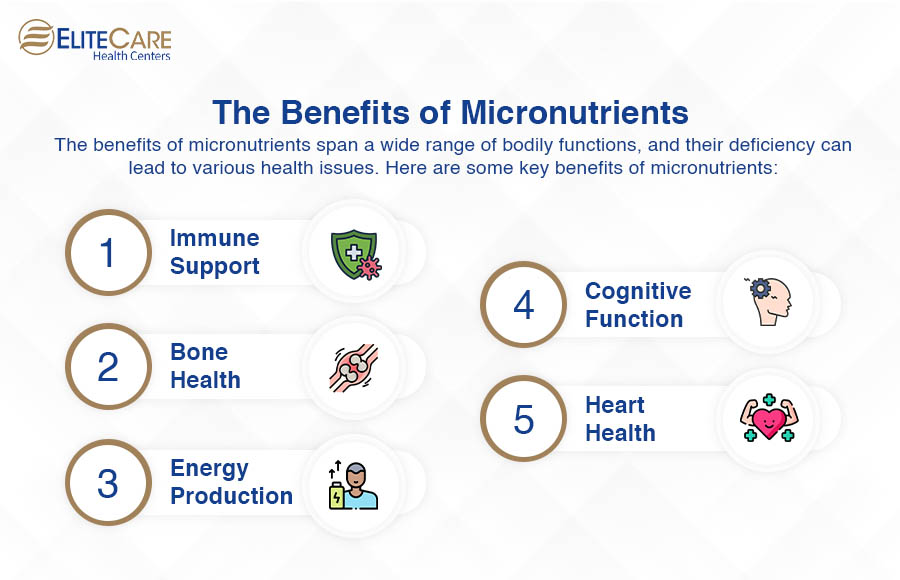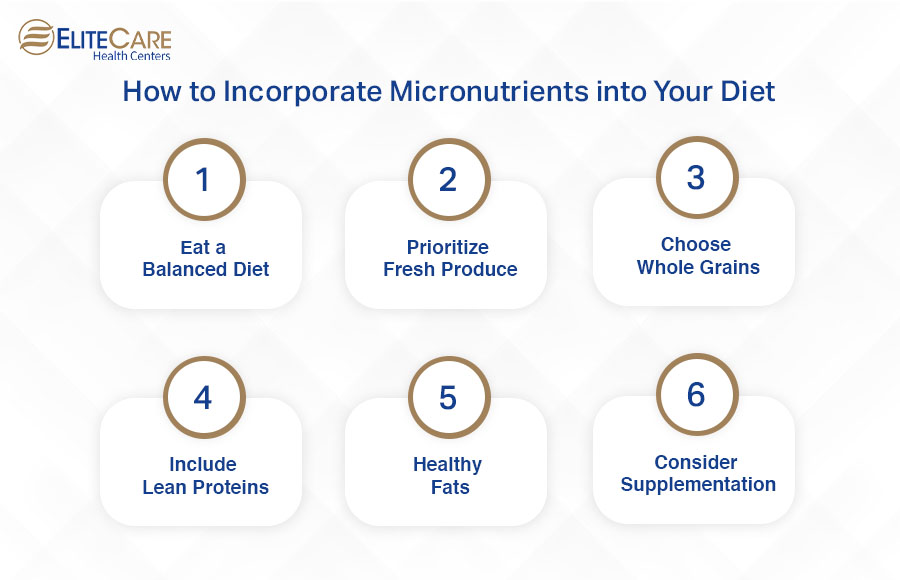
Carbohydrates, proteins, and fats are examples of macronutrients that are heavily stressed in the quest for optimal health. Although they are important for overall health, micronutrients—the vitamins and minerals that are essential for many body processes—are the unsung heroes of nutrition.
Micronutrients are necessary nutrients that the body needs in small quantities to sustain healthy physiological processes. Even though they are required in smaller amounts than macronutrients, they are essential for several bodily biochemical processes.
The main components of these micronutrients are vitamins and minerals, each of which has a special purpose.
What are Vitamins and Minerals?
Organic substances called vitamins are essential for growth, metabolism, and general health. They fall into two groups: water-soluble (like vitamin C and B vitamins) and fat-soluble (like vitamins A, D, E, and K). Fat-soluble vitamins are stored in the body’s fatty tissues and liver, while water-soluble vitamins are not stored and are excreted in the urine, making regular intake necessary.
On the other hand, minerals are inorganic components that are essential for many physiological functions, such as the development of bones, fluid balance, neuron function, and the production of energy. They are divided into two categories: trace minerals, which are needed in lesser numbers, and macrominerals, which are needed in higher proportions.
The Benefits of Micronutrients
The benefits of micronutrients span a wide range of bodily functions, and their deficiency can lead to various health issues. Here are some key benefits of micronutrients:

1. Immune Support:
Micronutrients that support immunological function include vitamins C, D, and zinc. The antioxidant and immune-cell-boosting qualities of vitamin C are well-known and zinc is important for the growth and function of immune cells. Vitamin D helps control immunological responses and lower inflammation.
2. Bone Health:
Micronutrients including calcium, vitamin D, magnesium, and phosphorus are crucial for preserving bone health and avoiding ailments such as osteoporosis. Magnesium and phosphorus are also involved in the creation and maintenance of bones, whereas calcium and vitamin D combined support bone mineralization
3. Energy Production:
For food to be converted into energy, B vitamins such as thiamine (B1), riboflavin (B2), niacin (B3), pantothenic acid (B5), pyridoxine (B6), biotin (B7), folate (B9), and cobalamin (B12) are essential. They contribute to metabolic processes that turn proteins, lipids, and carbs into energy.
4. Cognitive Function:
Vitamins E, B6, B12, and folate are micronutrients vital to preserving cognitive function and lowering the risk of age-related cognitive decline. These nutrients are involved in nerve signaling, antioxidant defense, and the creation of neurotransmitters.
5. Heart Health:
Micronutrients like omega-3 fatty acids, potassium, magnesium, and antioxidants (such as vitamins C and E) contribute to heart health by reducing inflammation, regulating blood pressure, lowering cholesterol levels, and preventing oxidative damage to blood vessels.
How to Incorporate Micronutrients into Your Diet
Incorporating micronutrients into your diet is essential for maintaining optimal health. Here are some tips to help you ensure you’re getting an adequate intake of these vital nutrients:

1. Eat a Balanced Diet:
Eat a wide range of foods high in nutrients from all dietary groups, such as whole grains, fruits, vegetables, lean meats, and healthy fats. Make an effort to incorporate into your meals foods high in vitamins and minerals.
2. Prioritize Fresh Produce:
Vegetables and fruits are great providers of antioxidants, minerals, and vitamins. To make sure you’re getting a variety of micronutrients at every meal, try to fill half of your plate with colorful vegetables and fruits.
3. Choose Whole Grains:
Choose whole grains such as brown rice, quinoa, and oats over refined grains. Whole grains are rich in B vitamins, magnesium, and fiber, which are essential for energy production and overall health.
4. Include Lean Proteins:
Choose lean sources of protein such as poultry, fish, tofu, beans, lentils, and legumes. These foods not only provide essential amino acids but also contain micronutrients like iron, zinc, and B vitamins.
5. Healthy Fats:
Increase your intake of foods high in unsaturated fats, such as olive oil, nuts, seeds, and avocados. In addition to being crucial for general health, these fats also improve the absorption of fat-soluble vitamins, such as A, D, E, and K.
6. Supplementation:
While it’s best to obtain micronutrients from food sources, supplementation may be necessary for certain individuals, such as those with specific dietary restrictions, nutrient deficiencies, or medical conditions. Make sure you consult with your doctor before starting any supplements.
The Importance of Micronutrients in Disease Prevention
Micronutrients play a crucial role in disease prevention, and their deficiency can increase the risk of various health conditions. Here’s how micronutrients contribute to preventing common diseases:
1. Cardiovascular Disease:
Several micronutrients, including omega-3 fatty acids, potassium, magnesium, and antioxidants like vitamins C and E, have been associated with a reduced risk of cardiovascular disease. These nutrients help lower blood pressure, reduce inflammation, and protect against oxidative damage to the cardiovascular system.
2. Osteoporosis:
Adequate intake of calcium, vitamin D, magnesium, and phosphorus is essential for maintaining bone health and reducing the risk of osteoporosis and fractures. These micronutrients support bone mineralization and density, helping to prevent bone loss over time.
3. Cancer:
Micronutrients such as vitamins A, C, E, and selenium have antioxidant properties that help protect cells from oxidative damage and reduce the risk of cancer. Additionally, certain vitamins and minerals play roles in DNA repair, cell differentiation, and immune function, which are important for cancer prevention.
4. Diabetes:
Micronutrients like chromium, magnesium, and vitamin D play roles in insulin sensitivity and glucose metabolism, making them important for preventing type 2 diabetes and managing blood sugar levels. Adequate intake of these nutrients can help reduce the risk of insulin resistance and diabetes complications.
5. Immune Function:
Micronutrients such as vitamins C, D, and zinc are essential for supporting immune function and reducing the risk of infections and autoimmune diseases. These nutrients help regulate immune responses, enhance immune cell function, and reduce inflammation, which are critical for maintaining a healthy immune system.
Dietary Sources and Micronutrient-Rich Foods
Obtaining micronutrients from a balanced diet rich in whole foods is the best way to ensure optimal health and prevent nutrient deficiencies.
Here are some dietary sources of key vitamins and minerals:
- Vitamin A is found in orange and yellow fruits and vegetables (such as carrots, sweet potatoes, and apricots), dark leafy greens (such as spinach and kale), and liver.
- Vitamin C is abundant in citrus fruits (such as oranges, lemons, and grapefruits), strawberries, kiwi, and tomatoes.
- Mainly obtained through sunlight exposure, Vitamin D is also found in fatty fish, egg yolks, and fortified dairy products.
- Vitamin E is found in nuts and seeds (such as almonds, sunflower seeds, and hazelnuts), vegetable oils, and green leafy vegetables.
- Green leafy vegetables (such as kale, spinach, and broccoli), cabbage, and fermented foods like sauerkraut and natto are rich sources of Vitamin K.
- Calcium is found abundantly in dairy products, fortified plant-based milk alternatives, green leafy vegetables, tofu, and almonds.
Micronutrients are the unsung heroes of nutrition, playing essential roles in numerous physiological processes that support overall health and well-being. You can harness the power of micronutrients and create the foundation for a better life by including a range of foods high in micronutrients in your diet and making sure you’re getting enough vitamins and minerals.
Connect with one of the board-certified primary care physicians at EliteCare HC, one of the best medical clinics in Florida. Visit our website or call +1 888-596-2090 for an appointment.
Frequently Asked Questions
To ensure you’re getting enough micronutrients in your diet, focus on consuming a wide variety of nutrient-dense foods from all food groups. Fill your plate with colorful fruits and vegetables, choose whole grains, and include lean sources of protein.
Some common signs of micronutrient deficiency include fatigue, weakness, impaired immune function, poor wound healing, cognitive deficits, bone abnormalities, and changes in skin, hair, and nails.
Yes, it is possible to overdose on certain micronutrients, particularly fat-soluble vitamins. Consuming excessive amounts of certain vitamins and minerals can lead to toxicity and adverse health effects.





